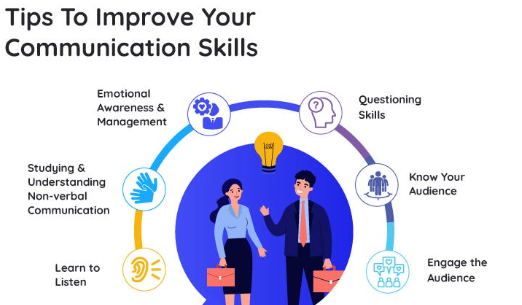Effective communication skills remains a foundational component for achieving success in personal and professional domains alike. Gaining mastery over this ability not only cultivates more robust relationships but also presents innumerable opportunities. Here are seven time-tested approaches to uplift your communication talents.
Understanding Verbal and Non-Verbal Communication Skills Cues
Verbal communication goes beyond merely exchanging words, as it also incorporates gestures, facial displays, and inflection. Developing proficiency in deducing meaning from these signals and synchronizing them with one’s message strengthens lucidity and promotes improved comprehension in all dealings. While speech plays a significant role, it is important to remember that how something is said can be just as influential as what is said. By paying close attention to nonverbal factors and ensuring they complement the overarching point, exchanges of information become markedly more cohesive and unambiguous.
Active Listening: Key to Meaningful Conversations
Engaging in active listening entails not just hearing but comprehending and empathizing with the speaker. This approach promotes meaningful dialogue, strengthens relationships, and minimizes misunderstandings.
Crafting Impactful Messages
Being able to communicate ideas in an organized and efficient manner is extremely important. Developing messages that are straightforward, brief, and customized to your listeners’ background and interests guarantees successful conveyance of your perspectives, making a strong impression. While clarity is key, varying sentence structures and including relevant examples can help further illuminate your points. Consider both what you want to express as well as how different people may receive your words, then craft your response accordingly.
Adapting Communication Styles
Understanding that people communicate in diverse ways and adjusting your method appropriately is essential. Having adaptability in how you interact allows for smooth engagement with those possessing varied inclinations and dispositions. It is important to acknowledge the uniqueness of each person and tailor your approach in a manner that best suits their preferences to ensure clear understanding. By recognizing differences in communication styles, we can better connect with one another despite variances and work together effectively.

See Also: Enhancing Productivity with Timed Efficiency
Constructive Feedback and Empathy
Providing feedback in a considerate manner while showing compassion establishes a climate that supports development and shared comprehension. Maintaining sincerity with care clears a path for beneficial exchange and favorable results. Expressing viewpoints truthfully yet thoughtfully allows for discussions that advance mutual learning. Both parties can gain useful insights through respectful listening and discussion aimed at understanding different perspectives.
Conflict Resolution Through Communication
Navigating conflicts with a communication-centric approach facilitates resolution and promotes harmony. Effective communication serves as a bridge to reconcile differences and reach amicable solutions.
Cultivating Emotional Intelligence
Emotional intelligence empowers individuals to manage emotions, understand others’ perspectives, and navigate social complexities adeptly. Developing this skill amplifies communication efficacy in various situations.
Improving your communication abilities is more than just social connection; it’s a life-changing path to both professional and personal success. By putting these tactics into practice, you’ll be able to handle a variety of situations with impact, clarity, and confidence.
FAQs: Elevating Communication Skills
Q: How long does it take to improve communication skills significantly?
Improvement timelines vary, but consistent practice and dedication can yield noticeable enhancements in a few weeks to several months.
Q: Are online courses effective in improving communication skills?
Yes, reputable online courses offer structured learning experiences with practical exercises, enhancing communication abilities.
Q: Can introverts develop strong communication skills?
Absolutely, introverts can cultivate effective communication through strategies like active listening and tailored messaging.
Q: Is body language crucial in effective communication?
Yes, body language conveys nuances and complements verbal communication, significantly impacting overall message delivery.
Q: How can one overcome the fear of public speaking?
Practice, preparation, and gradual exposure to public speaking situations help diminish fear and build confidence.
Q: Can technology aid in improving communication skills?
Yes, utilizing tools like video conferencing, online courses, and communication apps can complement skill development.
Conclusion: Mastering Communication for Success
Improving communication abilities is a huge help while negotiating the challenges of both the personal and professional spheres. Effective communication is based on a foundation of understanding verbal and nonverbal signs, active listening, creating messages that are impactful, and adjusting communication methods. Furthermore, improving interactions and relationships is possible through developing emotional intelligence, resolving conflict, and encouraging empathy.
Through the adoption of these tactics and regular use, people can improve their communication skills, cultivate deep connections, settle disputes, and succeed both personally and professionally.

